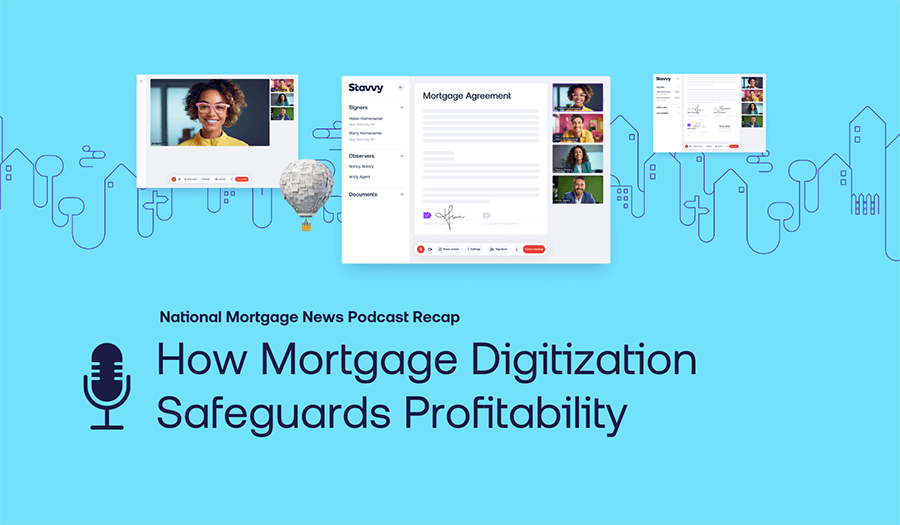Lenders are looking to title and settlement agents and closing attorneys to wow customers on closing day with digital options. Similarly, today’s homeowner is looking for a simple, digital closing experience, arguably making remote online notarization (RON) one of the most important digital tools for every title and settlement agency to consider.
RON allows title agents and closing attorneys to simultaneously serve the needs of lenders and homeowners while helping their organization grow, become more efficient, and save time and money. By adding RON to your digital closing toolkit, the business benefits are limitless, a topic we cover more extensively in this free RON infographic.
Understanding RON is the first step to bettering your business on a customer, partner, and operational level. Below are answers to some of our most frequently asked questions about remote notarization.
Most frequently asked questions about remote online notarization
What is the difference between IPEN and RON?
There is a lot of confusion around RON and IPEN or in-person electronic notarization, and rightfully so; it is more similar than different. The one difference between IPEN and RON is that with IPEN, the signer must physically be present with the notary. With RON, notarization happens electronically via audio-visual technology allowing the signer and electronic notary to be in separate physical locations. If you’re trying to determine whether IPEN or RON makes sense for your business, you can learn more about popular electronic notarization methods here.
What technology is used for remote online notarization?
Remote online notarization is the electronic notarization of official mortgage documents and, at a minimum, requires audio-video technology. In addition to audio-video technology, multi-factor authorization, electronic witnessing, ID verification, eSignature, and digital notary seals make for an even more seamless and secure digital closing experience. You can learn more about popular eClosing features on our blog.
How often do investor requirements for remote online notarization change?
Investor requirements don’t usually change; however, the guidelines investors and title insurance companies set forth play an essential role in ensuring that a mortgage is sellable and insurable post-closing. It is important to align yourself with a digital mortgage technology partner who puts compliance first, is approved by the title underwriters and investors you work with, and factors the appropriate overlays and regulatory criteria into their product design.
Is remote notarization permanent?
More than half of the United States has enacted permanent RON laws, including New York, Florida, and Texas. Therefore, we believe that RON is here to stay and will continue to grow in popularity amongst lenders, title and settlement agents, and homeowners.
Is remote online notarization allowed in all states?
Over half of the United States currently allow remote online notarization. However, determining if your state accepts RON is no small feat, especially if you conduct business across multiple states. If you don’t have the time or resources to stay current on RON legislation, the Stavvy platform has a built-in tool that aggregates laws at the town, county, and state levels. We created the Eligibility Engine to solve this time-consuming problem and help mortgage professionals nationwide determine electronic notarization eligibility in an instant.
What is a MISMO® RON provider?
A MISMO® RON provider is a technology solution that complies with MISMO® standards and best practices. Partnering with a technology company that is MISMO® certified is important because the certification validates that the product complies with state-level RON requirements. If you’re looking to add remote online notarization to your closing options, selecting a solution that is MISMO® certified is a good first step.
Is remote online notarization secure?
Performing an eClosing using RON doesn’t mean sacrificing security. In fact, the safety measures enacted with RON may be even more secure than a traditional in-person closing, and here’s why.
RON helps eliminate the risk of fraud through better identity authentication. Let’s use the Stavvy digital mortgage platform as an example. Stavvy records and saves every notarization session for review post-closing. Additionally, all signers, remote notaries, and closing participants are verified via knowledge-based authentication (KBA) and ID cards before the signing session begins. This level of identity proofing alone is more secure than traditional, in-person methods.
When conducting a RON closing, the technology you use should also ensure that the fully executed closing documents are tamper-sealed and, therefore, unable to be altered post-signing. This security measure preserves the integrity of your documentation.
After the digital closing with RON is complete, all documents are sent and stored electronically for an extra layer of defense.
The Stavvy digital mortgage platform takes RON closing security even further by producing an accompanying digital audit trail, sending secure meeting invitation links with multi-factor authentication, and ensuring that every state-commissioned online notary seal is backed by a secure cryptographic certificate. Additionally, Stavvy is a MISMO® certified solution and SOC 2 compliant.
How hard is it to adopt RON technology?
Adding RON technology to your closing workflow is relatively straightforward. However, there is a training component like anything new. Onboarding with the right technology partner should help ease the transition and position you as an expert in no time.
Digital closings with RON are gaining popularity among homeowners, lenders, and title companies. Homeowners enjoy the convenience a digital closing provides, and lenders are eager to meet customers where they are and lower the cost of originating a loan. Similarly, title and settlement agents are quickly realizing the operational efficiencies of a digital-first approach.
Learn more about how the  is taking real estate beyond documents.
is taking real estate beyond documents.
Editor's note: This post was originally published in August 2022 and has been updated.



![[Webinar Recap] Advancing Your Digital Default Servicing Strategy](https://blog.stavvy.com/hubfs/advancing-your-digital-default-servicing-strategy-blog-recap.png)